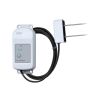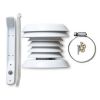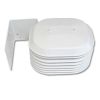HOBO MX2300 Temp/RH Loggers
Features
- Weatherproof housing for use in outdoor or condensing environments
- Small-diameter, external sensor versions for measurements in tight spaces
- Wireless setup & download with Bluetooth Low Energy (BLE)
- Expedited repair and warranty service
- Lifetime technical support
- More
Overview
The Onset HOBO MX2300 Series Temp/RH loggers allow users to set up and offload loggers wirelessly from any mobile device--eliminating the need to take a laptop or data shuttle into the field to retrieve data.
Models
The HOBO MX2300 Series offers five models covering a broad range of outdoor monitoring applications, from agricultural research to forest ecology studies. The series includes internal sensor models that are highly durable and easy to deploy, and external probe models that are well-suited for monitoring conditions in soils, water, walls, and more.
| Temperature Sensor | ||||
| Range | MX2301A and MX2305 internal sensors: -40 to 70°C (-40 to 158°F) MX2302A external temperature sensor: -40 to 70°C (-40 to 158°F) MX2303 and MX2304 external sensors: -40 to 100°C (-40 to 212°F), with tip and cable immersion in fresh water up to 50°C (122°F) for one year |
|||
| Accuracy | ±0.25°C from -40 to 0°C (±0.45 from -40 to 32°F) ±0.2°C from 0 to 70°C (±0.36 from 32 to 158°F) ±0.25°C from 70 to 100°C (±0.45 from 158 to 212°F), MX2303 and MX2304 only |
|||
| Resolution | MX2301A and MX2302A: 0.02°C (0.036°F) MX2303, MX2304, and MX2305: 0.04°C (0.072°F) |
|||
| Drift | <0.01°C (0.018°F) per year | |||
| Relative Humidity Sensor* (MX2301A, MX2302A only) | ||||
| Range | 0 to 100% RH, -40° to 70°C (-40° to 158°F); exposure to conditions below -20°C (-4°F) or above 95% RH may temporarily increase the maximum RH sensor error by an additional 1% | |||
| Accuracy | ±2.5% from 10% to 90% (typical) to a maximum of ±3.5% including hysteresis at 25°C (77°F); below 10% RH and above 90% RH ±5% typical | |||
| Resolution | 0.01% | |||
| Drift | <1% per year typical | |||
| Response Time (typical, to 90% of change) | ||||
| Temperature | Without Solar Radiation Shield | With RS1/M-RSA Solar Radiation Shield | With RS3-B Solar Radiation Shield | |
| MX2301A internal sensor |
17 minutes in air moving 1 m/sec | 24 minutes in air moving 1 m/sec | NA | |
| MX2302A external sensor |
3 minutes, 45 seconds in air moving 1 m/sec | 7 minutes, 45 seconds in air moving 1 m/sec | 6 minutes, 30 seconds in air moving 1 m/sec | |
| MX2303/MX2304 external sensors |
3 minutes in air moving 1 m/sec; 20 seconds in stirred water | 7 minutes in air moving 1 m/sec | 4 minutes in air moving 1 m/sec | |
| MX2305 internal sensor |
17 minutes in air moving 1 m/sec | 24 minutes in air moving 1 m/sec | NA | |
| RH | Without Solar Radiation Shield | With RS1/M-RSA Solar Radiation Shield | With RS3-B Solar Radiation Shield | |
| MX2301A internal sensor |
30 seconds in air moving 1 m/sec | 40 seconds in air moving 1 m/sec | NA | |
| MX2302A external sensor |
15 seconds in air moving 1 m/sec | 30 seconds in air moving 1 m/sec | 30 seconds in air moving 1 m/sec | |
| Logger | ||||
| Operating Range | -40° to 70°C (-40° to 158°F) | |||
| Radio Power | 1 mW (0 dBm) | |||
| Transmission Range | Approximately 30.5 m (100 ft) line-of-sight | |||
| Wireless Data Standard | Bluetooth Low Energy (Bluetooth Smart) | |||
| Logging Rate | 1 second to 18 hours | |||
| Logging Modes | Fixed interval (normal, statistics) or burst | |||
| Memory Modes | Wrap when full or stop when full | |||
| Start Modes | Immediate, push button, date & time, or next interval | |||
| Stop Modes | When memory full, push button, date & time, or after a set logging period | |||
| Time Accuracy | ±1 minute per month 0° to 50°C (32° to 122°F) | |||
| Battery Type | 2/3 AA 3.6 Volt lithium, user replaceable | |||
| Battery Life | 2 years, typical with logging interval of 1 minute and Bluetooth Always On enabled; 5 years, typical with logging interval of 1 minute and Bluetooth Always On disabled. Faster logging intervals and statistics sampling intervals, burst logging, remaining connected with the app, excessive downloads, and paging may impact battery life. | |||
| Memory | MX2301A and MX2302A: 128 KB (63,488 measurements, maximum) MX2303, MX2304, and MX2305: 128 KB (84,650 measurements, maximum) |
|||
| Full Memory Download Time | Approximately 60 seconds; may take longer the further the device is from the logger | |||
| Dimensions | Logger housing: 10.8 x 5.08 x 2.24 cm (4.25 x 2.0 x 0.88 in.) External temperature sensor diameter: 0.53 cm (0.21 in.) External temperature/RH sensor diameter: 1.17 cm (0.46 in.) External sensor cable length: 2 m (6.56 ft) Solar radiation shield bracket: 10.8 x 8.3 cm (4.25 X 3.25 in.) |
|||
| Weight | Logger: 75.5 g (2.66 oz) Solar radiation shield bracket: 20.4 g (0.72 oz) |
|||
| Materials | Acetal, silicone gasket, stainless steel screws | |||
| Environmental Rating | NEMA 6 and IP67 | |||
- HOBO MX2305 Temp Data Logger
- Screws
- Cable ties
In The News
From Paddles to Phytoplankton: Studying Vermont’s Wildest Lakes
For six months of the year, Rachel Cray, a third-year PhD student at the Vermont Limnology Laboratory at the University of Vermont, lives between a microscope and her laptop, running data. For the other six months, she is hiking and canoeing four of Vermont’s lakes, collecting bi-weekly water samples. Cray studies algal phenology across four lakes in Vermont, US, that have low anthropogenic stress—or in other words, are very remote. Funded by the National Science Foundation Career Award to Dr. Mindy Morales, the lakes Cray researches part of the Vermont Sentinel Lakes Program, which studies 13 lakes in the area and, in turn, feeds into the Regional Monitoring Network, which operates in the Northeast and Midwest US.
Read MoreReimagining Water Filtration: How Monitoring and Science Enhance FloWater Filtration Systems
Over 50% of Americans think their tap water is unsafe , according to the Environmental Working Group (EWG). Other recent surveys have found that number to be as high as 70% of persons surveyed. Whether due to increased public awareness of water quality issues or confusion about how municipal water sources are regulated, there is a clear distrust of tap water in the United States. According to industry expert Rich Razgaitis, CEO and co-founder of the water purification company FloWater, this issue creates a damaging cycle. Razgaitis explained that the health and environmental problems associated with contaminated water aren’t the only issues. As people become increasingly aware that some tap water is unsafe, they resort to bottled water.
Read MoreMonitoring New Hampshire’s Aquatic Ecosystems: Continuous Data Collection in the Lamprey River Watershed
New Hampshire’s aquatic ecosystems provide a range of ecosystem services to the state and region. Resources and services like clean water, carbon storage, climate regulation, nutrient regulation, and opportunities for recreation all depend on New Hampshire’s aquatic ecosystems remaining healthy. Jody Potter, an analytical instrumentation scientist at the University of New Hampshire (UNH), is studying these aquatic ecosystems in hopes of developing an improved understanding of ecosystem services and their interactions with climate change, climate variability, and land use changes. [caption id="attachment_39799" align="alignnone" width="940"] Aquatic sensors in the Merrimack River in Bedford, NH, with I-293 in the background.
Read More



















